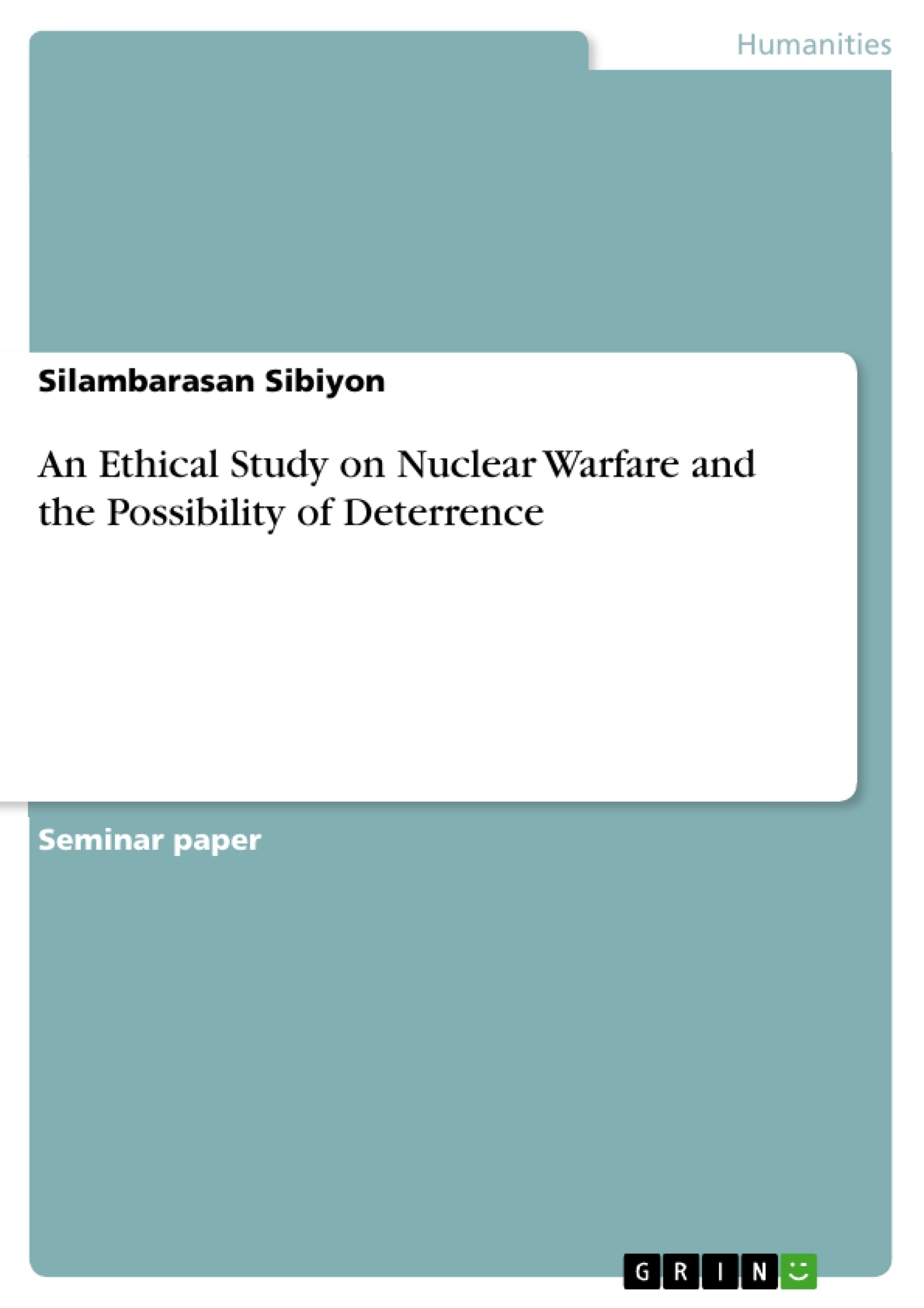This term paper aims to conduct an in-depth ethical analysis of nuclear warfare, exploring the moral dilemmas and consequences associated with the use of nuclear weapons. The paper begins by providing a comprehensive overview of the historical context and development of nuclear weapons, highlighting their immense destructive power and potential for catastrophic consequences.
Drawing upon various ethical frameworks, including consequentialism, deontology, and just war theory, this study examines the ethical considerations surrounding nuclear warfare. It delves into the moral implications of targeting civilian populations, the principle of proportionality in armed conflict, and the concept of deterrence as a means to prevent war. Additionally, it explores the notion of responsibility in relation to nuclear weapons possession and disarmament efforts.
Furthermore, this paper critically evaluates arguments both for and against nuclear deterrence as an ethically justifiable strategy. It analyzes the potential benefits of deterrence in preventing large-scale conflicts while also addressing concerns regarding its effectiveness, credibility, and potential for accidental or unauthorized use.
Moreover, this research investigates alternative perspectives on nuclear disarmament efforts and explores ethical considerations associated with non-proliferation treaties. It examines the role of international organizations such as the United Nations in promoting disarmament initiatives and fostering global cooperation.
Finally, this study assesses contemporary challenges posed by emerging technologies such as cyber warfare and autonomous weapons systems within the context of nuclear ethics. It highlights potential ethical dilemmas arising from these advancements and emphasizes the need for ongoing ethical analysis to address these evolving threats.
By examining these complex ethical issues surrounding nuclear warfare through various lenses, this term paper aims to contribute to a deeper understanding of the moral dimensions involved. Ultimately, it seeks to foster critical thinking about nuclear weapons policymaking while encouraging dialogue on global security challenges within an ethical framework.
Inhaltsverzeichnis (Table of Contents)
- INTRODUCTION
- Reason for Choosing the Topic
- Relevance of the Topic
- Acknowledgement
- Structure of the Paper
- MORALITY AND NUCLEAR WAR
- Nuclear Weapons and Deterrence
- Nuclear Deterrence's Possibility
- First Strike
- Technological Malfunctions
- Just War
- Just War according to St. Augustine
- Just War According to St. Thomas Aquinas
- Just War and Limits of Nuclear War
- Nuclear Disarmament
- The Pacifist Response
- The Survivalists Response
- The Fate of the World
- CONCLUSION
- Summary of the Paper
- Critical appraisal
Zielsetzung und Themenschwerpunkte (Objectives and Key Themes)
This term paper explores the ethical implications of nuclear warfare, aiming to analyze the morality of both possessing and using nuclear weapons. It delves into the concept of nuclear deterrence, its limitations, and the potential consequences of its failure. The paper also examines the just war theory as it relates to nuclear conflict, considering the complexities of applying traditional just war principles to the modern reality of nuclear weapons.
- The morality of nuclear deterrence and its potential for failure
- The applicability of just war theory to nuclear warfare
- The ethical considerations of nuclear disarmament
- The potential consequences of nuclear war for the world
- The historical context of nuclear weapons, particularly their use on Hiroshima and Nagasaki
Zusammenfassung der Kapitel (Chapter Summaries)
The first chapter introduces the topic of the term paper, explaining the author's personal motivation for choosing it and highlighting the contemporary relevance of the subject. The chapter also details the structure of the paper, outlining the content covered in each subsequent chapter.
Chapter two delves into the central theme of the paper, exploring the morality of nuclear warfare. It examines the concept of nuclear deterrence, analyzing its strengths and weaknesses, and the potential risks associated with it. The chapter also addresses the just war theory, specifically considering its applicability to the unique context of nuclear conflict.
Schlüsselwörter (Keywords)
The primary focus of this paper centers around the ethical analysis of nuclear warfare, encompassing concepts such as nuclear deterrence, just war theory, nuclear disarmament, and the potential consequences of nuclear conflict for humanity. It draws upon historical examples such as the bombings of Hiroshima and Nagasaki to highlight the destructive power and ethical concerns surrounding these weapons.
Is nuclear deterrence ethically justifiable?
The paper evaluates arguments for and against, considering whether the prevention of large-scale war justifies the moral risks of potential catastrophic failure.
What are the main risks of nuclear possession?
Key risks include technological malfunctions, unauthorized use, accidental launches, and the moral implications of targeting civilian populations.
How does Just War Theory apply to nuclear weapons?
Traditional theories (e.g., St. Augustine, Aquinas) struggle with nuclear war because the principles of proportionality and discrimination (protecting civilians) are nearly impossible to uphold.
What is the "Pacifist Response" to nuclear weapons?
The pacifist response argues for total disarmament, claiming that the possession or threat of using nuclear weapons is inherently immoral under any circumstances.
What role do international organizations play in disarmament?
The United Nations and non-proliferation treaties are essential for fostering global cooperation and promoting initiatives to reduce nuclear stockpiles.



